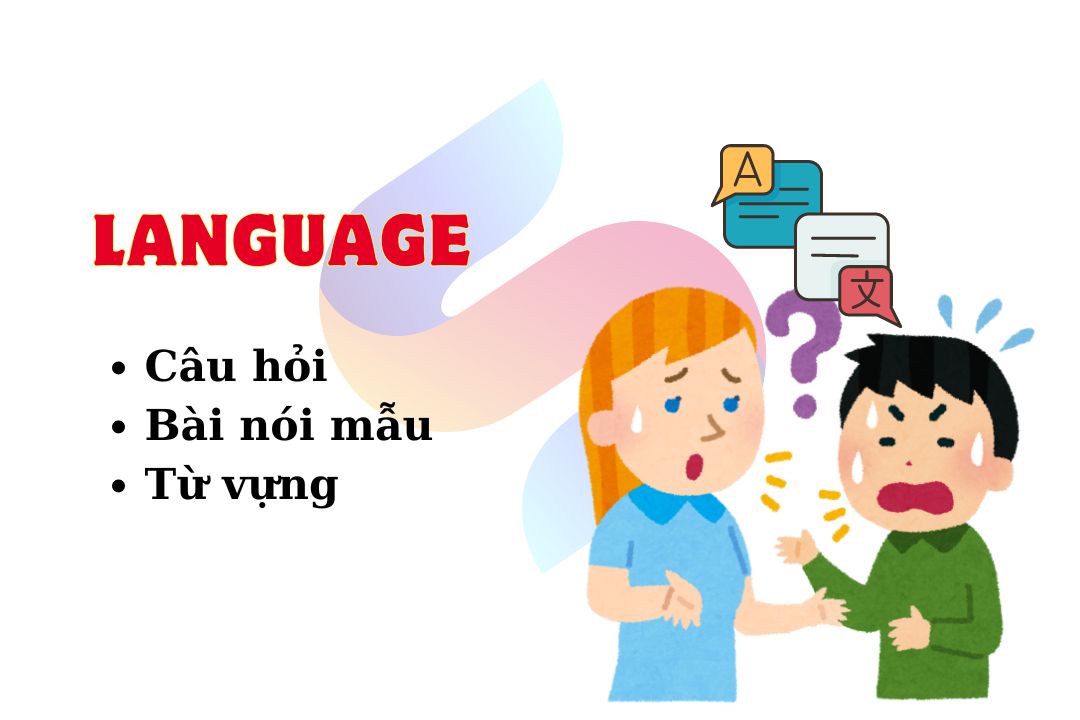Đội ngũ chuyên gia tại Smartcom English là tập hợp những chuyên gia đầu ngành trong lĩnh vực IELTS nói riêng và tiếng Anh nói chung. Với phương pháp giảng dạy sáng tạo, kết hợp với công nghệ AI, chúng tôi mang đến những trải nghiệm học tập độc đáo và hiệu quả. Mục tiêu lớn nhất của Smartcom Team là xây dựng một thế hệ trẻ tự tin, làm chủ ngôn ngữ và sẵn sàng vươn ra thế giới.
Chủ đề Language trong IELTS Speaking Part 3 thường liên quan đến việc thảo luận về ngôn ngữ, tầm quan trọng của việc học ngôn ngữ, sự biến đổi của ngôn ngữ, và những ảnh hưởng của việc đa ngôn ngữ đến cá nhân và xã hội. Dưới đây là một số dạng câu hỏi bạn có thể gặp và câu trả lời mẫu, cùng Smartcom tìm hiểu nhé!

● Can learning a language help you understand more about a culture?
● Why is it so difficult to learn a new language?
● How will language learning change in the future?
● Should governments invest more in second language learning in schools?
● What are the benefits of learning another language for your country?
● Why is it so difficult to learn a new language?
● How will language learning change in the future?
● Should governments invest more in second language learning in schools?
● What are the benefits of learning another language for your country?
Can learning a language help you understand more about a culture?
Việc học một ngôn ngữ có thể giúp bạn hiểu thêm về một nền văn hóa không?
=> Đưa ra câu trả lời chắc chắn về những yếu tố khiến ngôn ngữ có thể giúp bạn học được về một nền văn hóa cụ thể.
- Biểu hiện văn hóa: Ngôn ngữ tiết lộ thành ngữ, câu chuyện cười và truyền thống.
- Tương tác có ý nghĩa: Nói ngôn ngữ cho phép tương tác sâu hơn với người bản xứ.
- Bối cảnh văn hóa: Học ngôn ngữ thường liên quan đến việc nghiên cứu lịch sử và phong tục của nền văn hóa.
Từ vựng trong câu trả lời
- deepen: làm sâu sắc thêm
- cultural expressions: biểu đạt văn hóa
- grasp: nắm bắt
- gain insights into: đạt được cái nhìn sâu sắc về
- cultural contexts: bối cảnh văn hóa
- overall comprehension: hiểu biết tổng thể
- nuanced: sắc thái
Why is it so difficult to learn a new language?
Tại sao việc học một ngôn ngữ mới lại khó đến vậy?
Learning a new language can be difficult for several reasons. Firstly, it involves acquiring a completely new set of sounds, vocabulary, and grammar rules, which can be quite complex and unfamiliar compared to your native language. This often requires a significant amount of time and effort to master. Secondly, achieving fluency demands consistent practice and regular exposure to the language, as this helps solidify your understanding and ability to use it effectively. Moreover, many learners struggle with the fear of making mistakes and the challenge of building confidence in their speaking abilities. Finally, understanding the cultural nuances and context in which the language is used adds another layer of difficulty, as it involves more than just learning words and rules—it requires insight into cultural practices and expressions.
=> Đưa ra những lý do vì sao học ngôn ngữ mới rất khó:
- Độ phức tạp: Học các âm thanh, từ vựng và quy tắc ngữ pháp mới.
- Thực hành: Yêu cầu sử dụng và tiếp xúc thường xuyên để thành thạo.
- Sự tự tin: Vượt qua nỗi sợ mắc sai lầm.
- Sắc thái văn hóa: Hiểu bối cảnh và thực hành văn hóa.
Từ vựng trong câu trả lời
- native language: ngôn ngữ mẹ đẻ
- consistent: kiên định
- regular exposure: tiếp xúc thường xuyên
- solidify: củng cố
- struggle with: vật lộn với
- cultural nuances: sắc thái văn hóa
How will language learning change in the future?
Việc học ngôn ngữ sẽ thay đổi như thế nào trong tương lai?
Để có kết quả tốt trong phần IELTS Speaking Part 3 với chủ đề Language, bạn nên kết hợp hiểu biết của mình để trình bày về chủ đề cùng khả năng sử dụng ngôn ngữ một cách linh hoạt và kỹ năng giao tiếp hiệu quả. Hãy tự tin khi trình bày ý kiến của mình và thật tự tin trong khi thi. Chúc bạn đạt được thành công!
Nếu bạn đang băn khoăn nên học IELTS ở đâu để được hướng dẫn bài bản các kỹ thuật làm bài, hay muốn tìm hiểu rõ hơn về chi phí học IELTS phù hợp với nhu cầu của mình, thì Smartcom English là lựa chọn bạn không nên bỏ qua. Với đội ngũ giảng viên bản ngữ và các cựu du học sinh giàu kinh nghiệm, Smartcom luôn đồng hành cùng học viên trên hành trình chinh phục band điểm mơ ước một cách hiệu quả và tối ưu chi phí.
Kết nối với mình qua
Bài viết khác

![[PDF + Audio] Tải Sách IELTS Cambridge 19 (Kèm đáp án)](https://smartcom.vn/blog/wp-content/uploads/2024/06/ielts-cambridge-19_optimized.png)


![[PDF + Audio] Tải Sách IELTS Cambridge 17 (Kèm đáp án)](https://smartcom.vn/blog/wp-content/uploads/2024/07/sach-ielts-cambridge-17_optimized.jpg)

![[PDF + Audio] Tải Sách IELTS Cambridge 15 (Kèm đáp án)](https://smartcom.vn/blog/wp-content/uploads/2024/07/ielts-cambridge-15_optimized.jpg)








